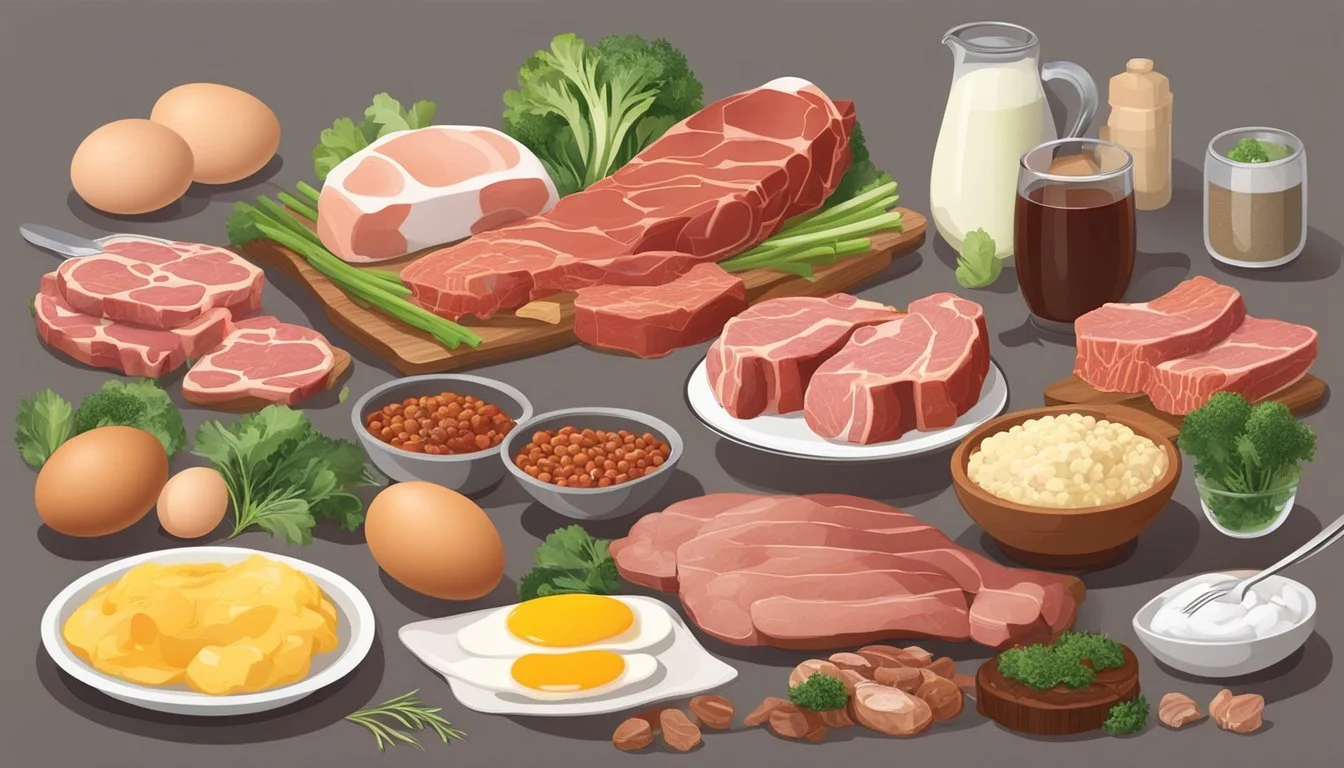Joe Rogan's Carnivore Diet Bombshell: The Podcast That's Melting Fat and Minds!
Joe Rogan, host of The Joe Rogan Experience podcast, has explored the carnivore diet extensively on his show. This controversial eating approach involves consuming only animal products, primarily meat, fish, and eggs. Rogan himself tried the carnivore diet for 30 days in January 2020, reporting significant weight loss and increased energy levels.
Several episodes of The Joe Rogan Experience have featured guests discussing the potential benefits and risks of the carnivore diet. Dr. Paul Saladino, a leading proponent of the diet, appeared on episode #1551 to share his expertise on the science behind this nutritional approach. Rogan has also documented his personal experiences with the diet, noting changes in his body composition and overall well-being.
The carnivore diet remains a topic of debate among nutrition experts and health professionals. While some advocates claim it can improve various health conditions, critics argue that it may lack essential nutrients found in plant-based foods. Rogan's platform has provided a space for both perspectives, allowing listeners to explore the complexities of this dietary approach.
The Carnivore Diet Overview
The Carnivore Diet is a restrictive eating plan focused solely on animal products. It has gained attention through high-profile advocates like Joe Rogan, who has experimented with and discussed it on his podcast.
Origins and Popularity
The Carnivore Diet emerged as an extension of low-carb and ketogenic diets. It gained traction in recent years through social media and celebrity endorsements. Proponents claim it can lead to weight loss, improved mental clarity, and reduced inflammation.
Joe Rogan's exploration of the diet in January 2020 and 2021 brought significant attention to this eating regimen. His experiences, shared on his popular podcast, sparked curiosity among his large audience.
Key Principles of a Meat-Only Diet
The Carnivore Diet, also known as the All-Meat Diet, centers on consuming only animal products. Key components include:
Meat (beef, pork, poultry, fish)
Eggs
Some dairy products (optional)
Excluded foods:
Fruits and vegetables
Grains and legumes
Processed foods
Advocates argue that this approach eliminates potentially harmful plant compounds and provides essential nutrients from animal sources.
Comparison with Other Diets
The Carnivore Diet differs significantly from other popular eating plans:
Diet Main Focus Allowed Foods Carnivore Animal products Meat, eggs, some dairy Keto High fat, low carb Fats, proteins, limited carbs Paleo Ancestral foods Meat, fish, fruits, vegetables, nuts Vegan Plant-based No animal products
Unlike Veganuary, which promotes plant-based eating, the Carnivore Diet takes an opposite approach. It eliminates all plant foods, contrasting sharply with most nutritional guidelines that emphasize fruit and vegetable consumption.
Joe Rogan's Experience with Carnivore Diet
Joe Rogan's foray into the carnivore diet revealed significant changes in his health and well-being. His journey showcased both the potential benefits and challenges of this unconventional eating approach.
Initial Transition to Carnivore Diet
Joe Rogan embarked on a 30-day carnivore diet challenge in January 2020. He consumed only animal products, focusing primarily on meat, fish, and eggs. The transition was part of his participation in "world carnivore month."
Rogan documented his experiences publicly, providing insights into the initial adjustment period. He reported feeling energetic but also experienced some digestive changes as his body adapted to the new dietary regime.
Personal Anecdotes and Results
During his carnivore diet experiment, Rogan noted several significant changes. He experienced substantial weight loss, dropping from 205 to 193 pounds - a reduction of approximately 12 pounds.
Rogan reported increased energy levels and improved mental clarity. He felt more alert and focused throughout the day. Interestingly, he also observed changes in his skin condition, vitiligo, though the exact nature of these changes wasn't specified.
His physical performance during workouts remained consistent, and he didn't report any negative impacts on his exercise routine.
Reflections and Recommendations
After completing the 30-day challenge, Rogan shared his reflections on the carnivore diet. He emphasized the importance of listening to one's body and adjusting the diet as needed.
Rogan acknowledged that while he experienced benefits, the carnivore diet might not be suitable for everyone. He encouraged individuals interested in trying the diet to consult with healthcare professionals before making drastic dietary changes.
In subsequent years, Rogan has revisited the carnivore diet. As of June 2023, he reported being back on the diet and feeling great, suggesting a continued positive experience with this eating approach.
Health Implications
The carnivore diet has sparked debate in the health community. Proponents claim benefits like weight loss and reduced inflammation, while critics raise concerns about nutritional deficiencies and long-term effects.
Nutritional Benefits and Concerns
The carnivore diet provides high amounts of protein and certain nutrients found in animal products. It's rich in amino acids, which are essential for muscle growth and repair. The diet also supplies vitamin B12, iron, and zinc.
However, it lacks fiber and many plant-based nutrients. This may lead to deficiencies in vitamins C and E, as well as various antioxidants. The high protein intake could potentially stress the kidneys in some individuals.
Calcium intake may be adequate if dairy is included, but could be low otherwise. The diet's high saturated fat content raises concerns about cardiovascular health.
Carnivore Diet and Inflammation
Some carnivore diet followers report reduced inflammation and improvements in autoimmune conditions. Joe Rogan has mentioned experiencing less joint pain and improved energy levels.
The diet eliminates many common allergens and inflammatory foods like sugar, grains, and processed items. This may contribute to reduced inflammation in some people.
However, the high intake of red meat might increase inflammation markers in others. The long-term effects on inflammatory conditions like arthritis remain unclear.
Long-Term Health Effects
The long-term health implications of the carnivore diet are not well-studied. Potential benefits include improved insulin sensitivity and weight management for some individuals.
Concerns exist about the diet's impact on gut health due to lack of fiber. The absence of plant-based antioxidants may affect long-term cellular health and aging processes.
Cardiovascular risk is a significant concern, given the high saturated fat intake. The diet's effects on cholesterol levels and heart health require further research.
Bone health may be impacted due to the acidic nature of the diet. This could potentially lead to increased calcium loss over time.
Carnivore Diet Food List
The carnivore diet focuses exclusively on animal-based foods, eliminating plant products entirely. This restrictive approach emphasizes high protein and fat intake while eliminating carbohydrates.
Acceptable Foods and Varieties
The carnivore diet allows a range of animal-derived foods. Beef is a staple, with grass-fed varieties often preferred for their nutrient profile. Steak serves as a primary protein source, offering essential amino acids and minerals.
Bacon provides a flavorful fat source, while eggs offer versatile nutrition. Organ meats like liver are highly valued for their nutrient density. Game meats such as elk add variety and unique flavors to the diet.
Fish and seafood are permitted, supplying omega-3 fatty acids. Poultry, including chicken and turkey, round out protein options. Some followers include dairy products like butter, heavy cream, and hard cheeses.
Foods to Avoid on Carnivore Diet
The carnivore diet strictly excludes all plant-based foods. This means no fruits, vegetables, grains, legumes, nuts, or seeds. Processed foods, sugars, and artificial sweeteners are also off-limits.
Beverages are limited to water and bone broth. Coffee and tea are debated among followers, with some allowing them in moderation. Alcohol is generally avoided due to its plant origins and potential effects on health.
Condiments and seasonings derived from plants are eliminated. This includes most spices, herbs, and sauces. Salt is typically the only seasoning used, with some practitioners opting for mineral-rich sea salt or pink Himalayan salt.
Supplementation and Nutrient Considerations
Joe Rogan's carnivore diet approach includes strategic supplementation to address potential nutritional gaps. He emphasizes the importance of certain vitamins and minerals while following this meat-based eating plan.
Essential Vitamin and Mineral Supplements
Rogan incorporates key supplements into his carnivore regimen. Vitamin D3 plays a crucial role, especially for those with limited sun exposure. He also takes vitamin K2 to support bone health and calcium absorption.
Fish oil supplements provide omega-3 fatty acids, which may be lacking in a diet focused primarily on land animals. Magnesium is another important addition, as it supports muscle function and energy production.
Rogan often mentions using a high-quality multivitamin to cover potential deficiencies. This helps ensure a broad spectrum of micronutrients are present in his diet.
Navigating Potential Nutritional Gaps
The carnivore diet can potentially lead to deficiencies in certain nutrients. Fiber is notably absent, which may impact gut health. To address this, some followers incorporate psyllium husk or other fiber supplements.
Vitamin C, typically obtained from fruits and vegetables, is another consideration. While meat contains some vitamin C, supplementation may be necessary to meet recommended intake levels.
Electrolyte balance is crucial on a carnivore diet. Rogan emphasizes the importance of adequate salt intake and sometimes uses electrolyte supplements to maintain proper hydration and mineral balance.
Carnivore Diet in Active Lifestyles
The carnivore diet has gained attention among athletes and fitness enthusiasts. Its effects on physical performance and energy levels have sparked debate in the athletic community.
Impact on Workout and Training
Many athletes report increased energy and improved recovery on the carnivore diet. Some UFC fighters have adopted this eating style, citing enhanced stamina during intense training sessions. The high protein intake supports muscle growth and repair.
Strength gains are common, with some lifters noting increases in their maximum lifts. The diet's focus on animal products provides essential amino acids for muscle synthesis. However, the lack of carbohydrates may affect glycogen stores, potentially impacting endurance activities.
Adaptation periods vary, with some athletes experiencing initial fatigue before seeing benefits. Proper electrolyte balance becomes crucial, as the diet can lead to increased water loss.
Performance in High-Intensity Sports
In high-intensity sports, the carnivore diet's effects are mixed. Some athletes report improved power output and quicker recovery between bouts of intense activity. The diet's anti-inflammatory properties may contribute to reduced muscle soreness.
UFC fighters like Chad Mendes have praised the diet for its impact on their performance. Energy levels often stabilize, leading to consistent output during training and competition. The absence of sugar crashes can benefit athletes in sports requiring sustained focus.
However, the lack of carbohydrates may pose challenges in glycolytic activities. Some athletes supplement with targeted carbohydrates around workouts to maintain performance. Careful monitoring of nutrient intake and hydration status is essential for optimal results in high-intensity sports on the carnivore diet.
Meal Planning and Preparation
Planning and preparing meals on the carnivore diet requires careful consideration of nutrient density and variety within animal-based foods. Effective strategies can help maintain dietary adherence while optimizing nutrition and managing costs.
Daily Meal Structure
The carnivore diet typically centers around 2-3 meals per day. Breakfast often consists of eggs and bacon or steak. Lunch and dinner usually feature larger portions of meat, such as grass-fed beef, lamb, or fish. Some practitioners include dairy products like butter or heavy cream.
Meal timing can be flexible, with some individuals opting for intermittent fasting approaches. Hydration is crucial, with water and bone broth being popular choices. Salt intake may need adjustment to maintain electrolyte balance.
Cooking Techniques and Flavor Enhancing
Grilling, pan-searing, and roasting are popular cooking methods for carnivore dieters. These techniques help retain nutrients and enhance flavors without adding plant-based ingredients.
Salt and pepper are common seasonings. Some include herbs like rosemary or thyme for variety. Butter or tallow can be used for cooking and flavor enhancement.
Meal prep strategies include:
Batch cooking meats for multiple days
Preparing hard-boiled eggs in advance
Slow-cooking tougher cuts of meat
Carnivore Diet on a Budget
Adhering to a carnivore diet can be costly, but budget-friendly options exist. Buying in bulk from local farms or butchers can reduce expenses. Opting for cheaper cuts of meat like chuck roast or ground beef helps manage costs.
Organ meats, such as liver and heart, are nutrient-dense and often more affordable. Eggs provide a cost-effective protein source. Frozen fish can be a budget-friendly alternative to fresh options.
Meal planning and shopping sales can further reduce expenses. Some practitioners incorporate fasting to decrease overall food consumption and costs.
Social and Environmental Considerations
The carnivore diet promoted by Joe Rogan raises important questions about its broader impacts on society and the environment. Proponents and critics debate the ethical, sustainability, and community aspects of this extreme eating approach.
Ethical and Sustainability Perspectives
The carnivore diet's heavy reliance on animal products sparks debates about animal welfare and environmental sustainability. Critics argue that increased meat consumption could lead to higher greenhouse gas emissions and greater land use for livestock. Supporters counter that properly managed grazing can improve soil health and carbon sequestration. The diet's potential impact on global food security is another concern, as meat production requires more resources than plant-based foods. Some advocates suggest focusing on regenerative farming practices and locally sourced, grass-fed meats to mitigate environmental concerns.
Community and Support Systems
World Carnivore Month, often discussed on the Joe Rogan Experience, has fostered a growing online community of carnivore dieters. These groups provide support, recipe ideas, and anecdotal evidence of health benefits. Social media platforms and forums allow carnivore diet followers to connect and share experiences. However, the diet's restrictive nature can create social challenges, potentially isolating individuals from shared meals and cultural food traditions. Some practitioners report difficulty dining out or attending social gatherings. The carnivore community often emphasizes the importance of medical supervision and gradual transition when adopting this unconventional eating pattern.





